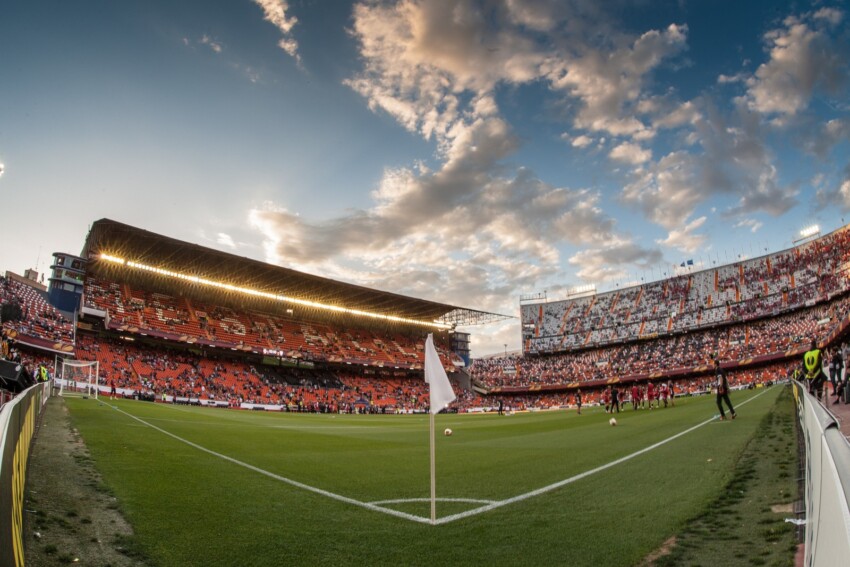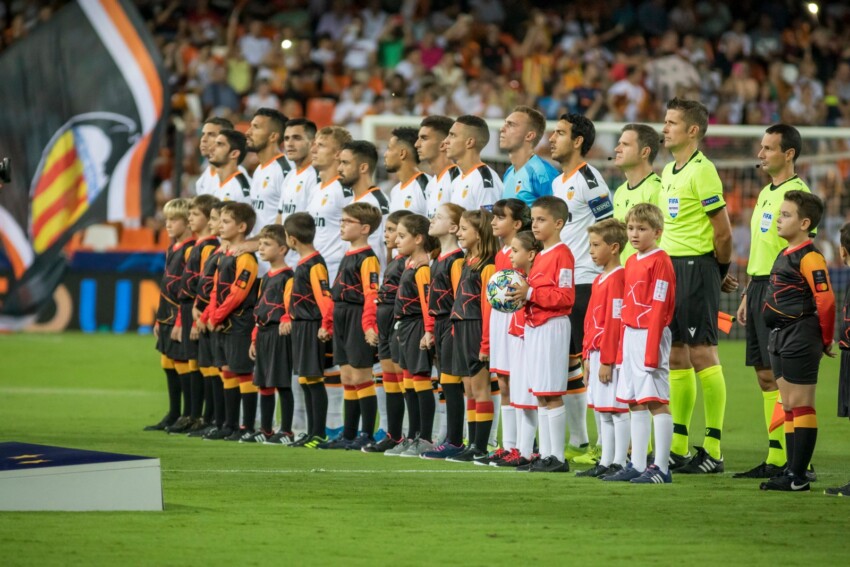
The Mestalla stadium is the home of Valencia CF, the city’s most important football club. Located next to the Turia Gardens about half an hour’s walk from the centre, it is a true icon of Spanish football, being the oldest stadium in La Liga to date. After numerous renovations over its more than 100-year history, today the Mestalla has a capacity of almost 50,000 seats and is best known for its very steep and iconic north stand.
Located in a densely populated neighbourhood and conveniently accessible by public transport, the Mestalla has also been the scene of important international matches and concerts by world-famous artists. Although the Nou Mestalla project has been underway for almost 20 years to replace it with a more modern stadium built on the outskirts of the city, Valencia’s current home is showing no signs of being decommissioned, due in part to the enormous complications of Nou Mestalla and the repeated changes to its design in an attempt to reduce costs that have become unsustainable.
And if you are a ‘simple’ football fan who has come to Valencia for a weekend or a holiday, take some time to take part in the Mestalla Forever Tour, the official guided tour of the stadium, which will allow you to go inside and feel all the emotions that the players feel when they walk down the tunnel to the changing rooms.
If you want to feel like a Valencia footballer for a day, take part in the official Valencia stadium tour, called the Mestalla Forever Tour. You will have the chance to enter the players’ changing rooms, walk down the tunnel leading to the pitch, and even visit the press room. To discover all the secrets and curiosities of Mestalla, the Mestalla Forever Tour is the ideal choice. The tours are led by expert guides who will be able to reveal all the curiosities of this beautiful venue, and learn about Valencia CF’s history and key anecdotes.
The Mestalla Forever Tour is available every day of the week: Monday to Saturday from 10:45 to 18:14, and Sundays from 10:45 to 13:30. There are several scheduled tours during each day, each lasting one hour, which are given in Spanish and English. In the event of sporting, operational or organisational needs, the tours may be suspended or totally modified.
It is possible to buy entrance tickets directly at the ticket offices, or to proceed online: in this case you will avoid the queue at the entrance and have the possibility of choosing the tour time. People from 12 to 65 years of age pay the full ticket price, while children from 5 to 12 years of age, pensioners, the disabled and the unemployed are entitled to reduced admission. For children from 0 to 4 years of age, admission is free.
Please note that the tour of the Valencia stadium is not suitable for people with reduced mobility. However, it will still be possible to visit the bench, the Valencia dressing rooms, the chapel, the referees’ dressing room, the mixed zone, the fan box and the Records Blanquinegres museum.
The history of the Mestalla began in 1923, when it was inaugurated with a friendly match between Valencia and Levante. The first renovation took place only four years later, but it was in the 1950s that the stadium experienced an almost complete renovation, according to a project that increased its capacity to 45500 spectators. Unfortunately, a massive flooding, the largest in Valencia’s modern history, hit the stadium within a few years of its reopening, which led to a second round of works, which included the installation of a large artificial lighting system.
The Mestalla stadium has recently completed a final phase of works and now has a majestic appearance, and a capacity to accommodate 49,430 fans.
The Mestalla has been the scene of many international matches, hosted several Cup finals including the 2011 King’s Cup final between Barcelona and Real Madrid, was the home of Levante, hosted several matches of the Spanish national football team and has been the stadium of Castellón and Real Madrid for a few editions of the Champions Cup. During the 82 World Cup, the Mestalla hosted Spain’s matches against Honduras, Yugoslavia and Northern Ireland. But above all, it hosted the greatest exploits of Valencia Club de Fútbol.
As far as non-sporting events are concerned, we highlight Prince’s concert that took place on 24 July 1990 and the famous Candlelight concert, on this occasion dedicated to Coldplay, on 14 September 2024.
Back in November 2006, plans for the construction of Valencia’s new stadium to replace the Mestalla were unveiled. This new stadium, named Nou Mestalla for reasons of continuity, was supposed to have a capacity of around 80,000 spectators; work began in August 2007 and was to be completed in 2009.
However, things did not go exactly as expected: due to financial problems the construction site was stopped, and after another four years the project was revised downwards, with the spectators reduced to 60,000. However, work never started again, until in 2021 the project was revised again, updating the capacity to 43,000-5,000 spectators.

Valencia Club de Fútbol is the city’s main team. Known as Valencia CF or simply as Valencia mainly abroad, it is one of the country’s most successful teams, and although it has been going through ups and downs in recent years, it is still one of the historic ‘bigs’ of Spanish football, having won 6 Spanish Championships, 8 Spanish Cups, 1 Spanish Super Cup, 1 UEFA Cup Winners’ Cup, 2 UEFA Super Cups and 1 Intertoto Cup. The team also boasts 13 Champions League appearances, the last one during the 2019-2020 season.
Valencia plays its home matches in its official black and white colours; since the mid-2000s, some details have appeared in more flamboyant colours, such as red and orange, for example as the outline of jerseys, collars or socks. In terms of individual players, the one with the most appearances in European cups is David Albelda with 101 tokens, while the top scorer is David Villa with 17 goals. In all, four Valencia players have won the Pichichi title, i.e. the top scorer in La Liga: they are Edmundo Suarez (twice), Ricardo De La Virgen, Waldo Machado and Mario Kempes (twice).
Valencia’s main rivalry, for parochial reasons, is against Levante, the city’s other team. The two teams face each other in what is known as the Derby del Turia, but the match is not played very often as Levante often play in the Segunda or Tercera division: their appearances in the top division of the Spanish league are currently only 16, with the last one in 2021-2022.
The rivalry against Villarreal, who face each other in the match known as the Derby de la Comunitat, is also very close, as is the rivalry against Getafe, which has resulted in particularly vibrant matches as the two teams often fight for similar objectives.
The Mestalla is the home of Valencia CF, known simply as Valencia. For the few who do not know it, it is one of the most important football teams in Spain. To see Valencia’s upcoming matches and buy tickets, click on the button below.
Tickets for Valencia CFThe Mestalla stadium in Valencia is located on Avenida de Suecia, east of the Turia gardens. You can get there comfortably by using bus numbers 10, 32, 71 and 80, as well as the tourist bus B (bus stop 11). You can also get there without any problems with the city metro, using the Aragòn stop on line 5 or the Facultats stop on line 3.
The stadium is not too far from the city centre: from the Xativa station, which marks the southern boundary of the centre, it takes 25 minutes on foot for a distance of less than 2 kilometres; the distance is roughly the same if you come from Placa de la Reina or Valencia Cathedral.
Valencia's Mestalla stadium is located on Avenida de Suecia, a few dozen metres from the Alameda metro stop, not far from the Turia gardens.
City Card allow you to save on public transport and / or on the entrances to the main tourist attractions.
